Business Environment Report: Nestle's Organisational Analysis
VerifiedAdded on 2020/01/28
|13
|5395
|180
Report
AI Summary
This report provides a detailed analysis of Nestle's business environment, examining various aspects of its operations. It begins by exploring the organizational purposes of businesses, differentiating between various types and their objectives, and specifically analyzing how Nestle fulfills the objectives of its diverse stakeholders, including primary, secondary, and key stakeholders. The report then delves into the nature of the national environment, explaining economic systems, the impact of fiscal and monetary policies on business activities, and the influence of competition policy and regulatory mechanisms on Nestle. Furthermore, it investigates the behavior of organizations within their market environment, detailing market structures, market forces, and the impact of the business and cultural environments on Nestle's strategies. Finally, the report assesses the significance of global factors, including international trade and the policies of the European Union, on Nestle's national business activities, providing a comprehensive overview of the challenges and opportunities that shape the company's operations. The report utilizes academic sources to support its findings and provide context for the analysis of Nestle's business environment.
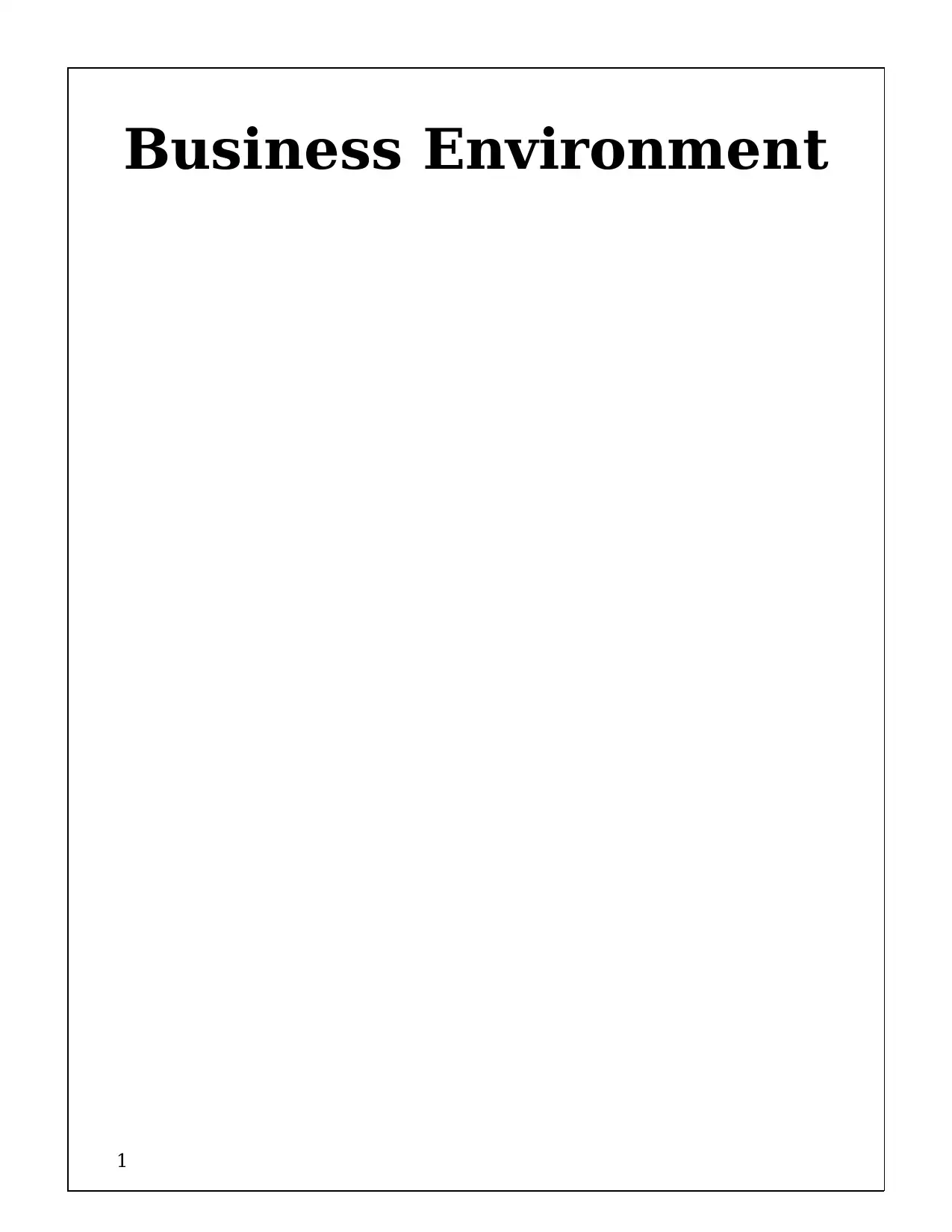
Business Environment
1
1
Paraphrase This Document
Need a fresh take? Get an instant paraphrase of this document with our AI Paraphraser
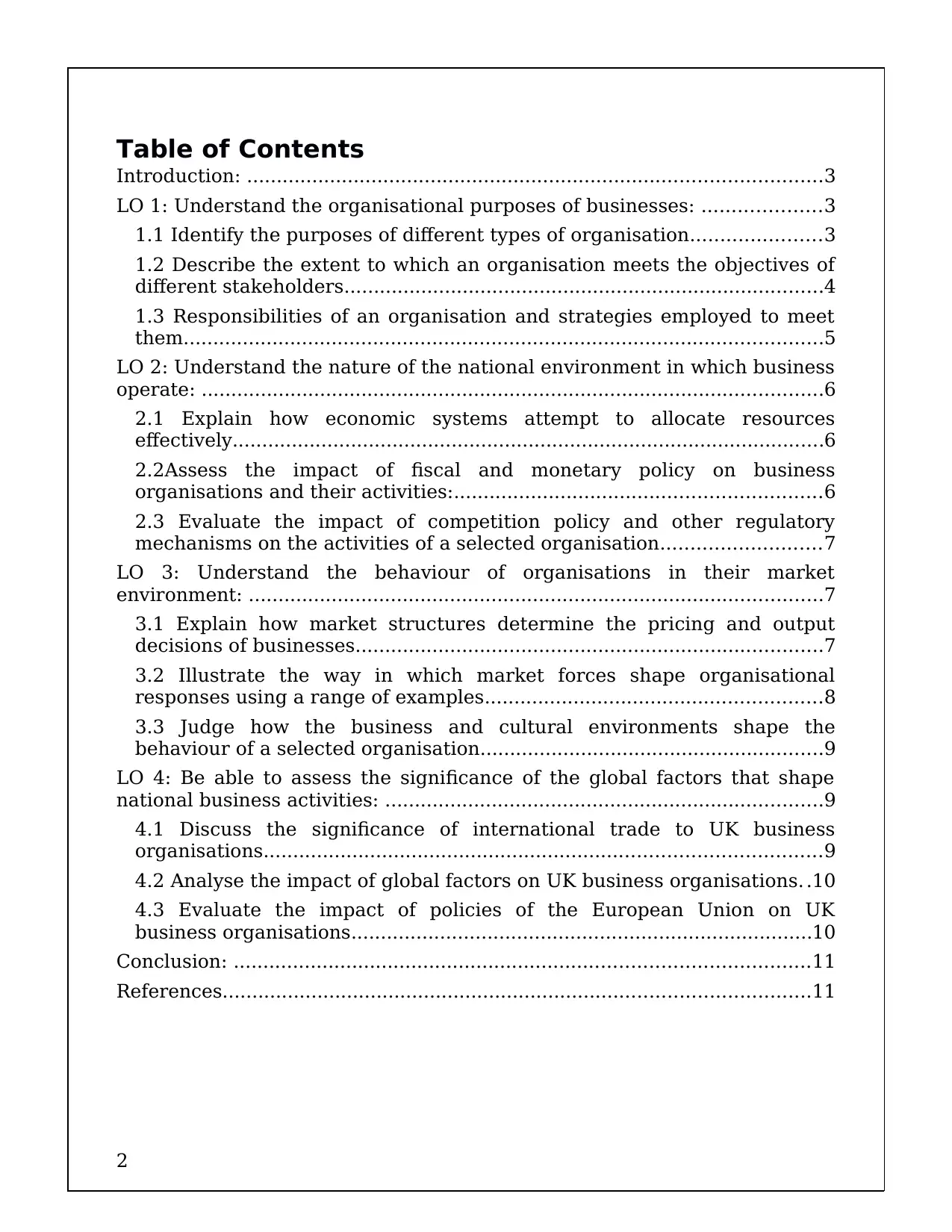
Table of Contents
Introduction: .................................................................................................3
LO 1: Understand the organisational purposes of businesses: ....................3
1.1 Identify the purposes of different types of organisation......................3
1.2 Describe the extent to which an organisation meets the objectives of
different stakeholders.................................................................................4
1.3 Responsibilities of an organisation and strategies employed to meet
them............................................................................................................5
LO 2: Understand the nature of the national environment in which business
operate: .........................................................................................................6
2.1 Explain how economic systems attempt to allocate resources
effectively....................................................................................................6
2.2Assess the impact of fiscal and monetary policy on business
organisations and their activities:..............................................................6
2.3 Evaluate the impact of competition policy and other regulatory
mechanisms on the activities of a selected organisation...........................7
LO 3: Understand the behaviour of organisations in their market
environment: .................................................................................................7
3.1 Explain how market structures determine the pricing and output
decisions of businesses...............................................................................7
3.2 Illustrate the way in which market forces shape organisational
responses using a range of examples.........................................................8
3.3 Judge how the business and cultural environments shape the
behaviour of a selected organisation..........................................................9
LO 4: Be able to assess the significance of the global factors that shape
national business activities: ..........................................................................9
4.1 Discuss the significance of international trade to UK business
organisations..............................................................................................9
4.2 Analyse the impact of global factors on UK business organisations. .10
4.3 Evaluate the impact of policies of the European Union on UK
business organisations..............................................................................10
Conclusion: .................................................................................................11
References...................................................................................................11
2
Introduction: .................................................................................................3
LO 1: Understand the organisational purposes of businesses: ....................3
1.1 Identify the purposes of different types of organisation......................3
1.2 Describe the extent to which an organisation meets the objectives of
different stakeholders.................................................................................4
1.3 Responsibilities of an organisation and strategies employed to meet
them............................................................................................................5
LO 2: Understand the nature of the national environment in which business
operate: .........................................................................................................6
2.1 Explain how economic systems attempt to allocate resources
effectively....................................................................................................6
2.2Assess the impact of fiscal and monetary policy on business
organisations and their activities:..............................................................6
2.3 Evaluate the impact of competition policy and other regulatory
mechanisms on the activities of a selected organisation...........................7
LO 3: Understand the behaviour of organisations in their market
environment: .................................................................................................7
3.1 Explain how market structures determine the pricing and output
decisions of businesses...............................................................................7
3.2 Illustrate the way in which market forces shape organisational
responses using a range of examples.........................................................8
3.3 Judge how the business and cultural environments shape the
behaviour of a selected organisation..........................................................9
LO 4: Be able to assess the significance of the global factors that shape
national business activities: ..........................................................................9
4.1 Discuss the significance of international trade to UK business
organisations..............................................................................................9
4.2 Analyse the impact of global factors on UK business organisations. .10
4.3 Evaluate the impact of policies of the European Union on UK
business organisations..............................................................................10
Conclusion: .................................................................................................11
References...................................................................................................11
2
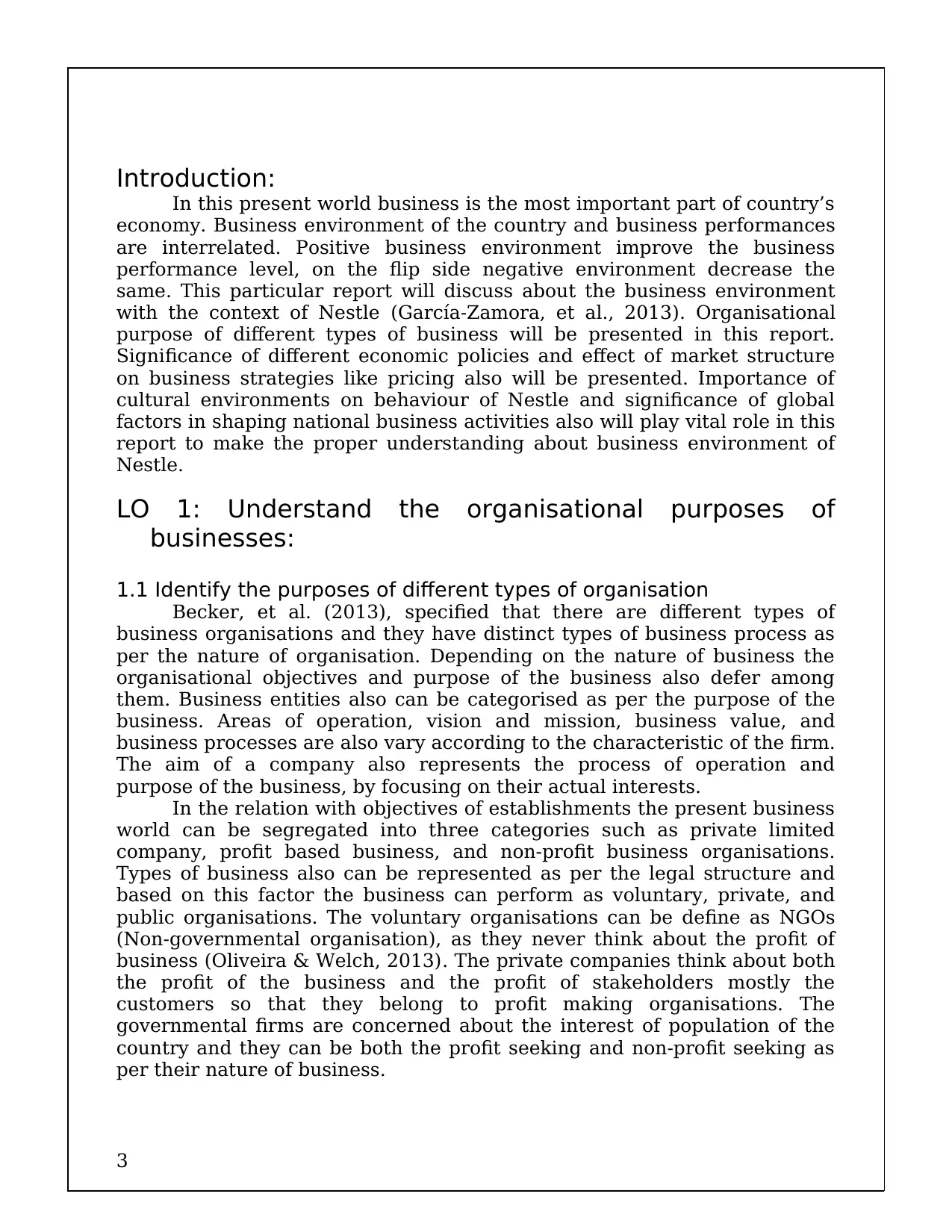
Introduction:
In this present world business is the most important part of country’s
economy. Business environment of the country and business performances
are interrelated. Positive business environment improve the business
performance level, on the flip side negative environment decrease the
same. This particular report will discuss about the business environment
with the context of Nestle (García-Zamora, et al., 2013). Organisational
purpose of different types of business will be presented in this report.
Significance of different economic policies and effect of market structure
on business strategies like pricing also will be presented. Importance of
cultural environments on behaviour of Nestle and significance of global
factors in shaping national business activities also will play vital role in this
report to make the proper understanding about business environment of
Nestle.
LO 1: Understand the organisational purposes of
businesses:
1.1 Identify the purposes of different types of organisation
Becker, et al. (2013), specified that there are different types of
business organisations and they have distinct types of business process as
per the nature of organisation. Depending on the nature of business the
organisational objectives and purpose of the business also defer among
them. Business entities also can be categorised as per the purpose of the
business. Areas of operation, vision and mission, business value, and
business processes are also vary according to the characteristic of the firm.
The aim of a company also represents the process of operation and
purpose of the business, by focusing on their actual interests.
In the relation with objectives of establishments the present business
world can be segregated into three categories such as private limited
company, profit based business, and non-profit business organisations.
Types of business also can be represented as per the legal structure and
based on this factor the business can perform as voluntary, private, and
public organisations. The voluntary organisations can be define as NGOs
(Non-governmental organisation), as they never think about the profit of
business (Oliveira & Welch, 2013). The private companies think about both
the profit of the business and the profit of stakeholders mostly the
customers so that they belong to profit making organisations. The
governmental firms are concerned about the interest of population of the
country and they can be both the profit seeking and non-profit seeking as
per their nature of business.
3
In this present world business is the most important part of country’s
economy. Business environment of the country and business performances
are interrelated. Positive business environment improve the business
performance level, on the flip side negative environment decrease the
same. This particular report will discuss about the business environment
with the context of Nestle (García-Zamora, et al., 2013). Organisational
purpose of different types of business will be presented in this report.
Significance of different economic policies and effect of market structure
on business strategies like pricing also will be presented. Importance of
cultural environments on behaviour of Nestle and significance of global
factors in shaping national business activities also will play vital role in this
report to make the proper understanding about business environment of
Nestle.
LO 1: Understand the organisational purposes of
businesses:
1.1 Identify the purposes of different types of organisation
Becker, et al. (2013), specified that there are different types of
business organisations and they have distinct types of business process as
per the nature of organisation. Depending on the nature of business the
organisational objectives and purpose of the business also defer among
them. Business entities also can be categorised as per the purpose of the
business. Areas of operation, vision and mission, business value, and
business processes are also vary according to the characteristic of the firm.
The aim of a company also represents the process of operation and
purpose of the business, by focusing on their actual interests.
In the relation with objectives of establishments the present business
world can be segregated into three categories such as private limited
company, profit based business, and non-profit business organisations.
Types of business also can be represented as per the legal structure and
based on this factor the business can perform as voluntary, private, and
public organisations. The voluntary organisations can be define as NGOs
(Non-governmental organisation), as they never think about the profit of
business (Oliveira & Welch, 2013). The private companies think about both
the profit of the business and the profit of stakeholders mostly the
customers so that they belong to profit making organisations. The
governmental firms are concerned about the interest of population of the
country and they can be both the profit seeking and non-profit seeking as
per their nature of business.
3
⊘ This is a preview!⊘
Do you want full access?
Subscribe today to unlock all pages.

Trusted by 1+ million students worldwide
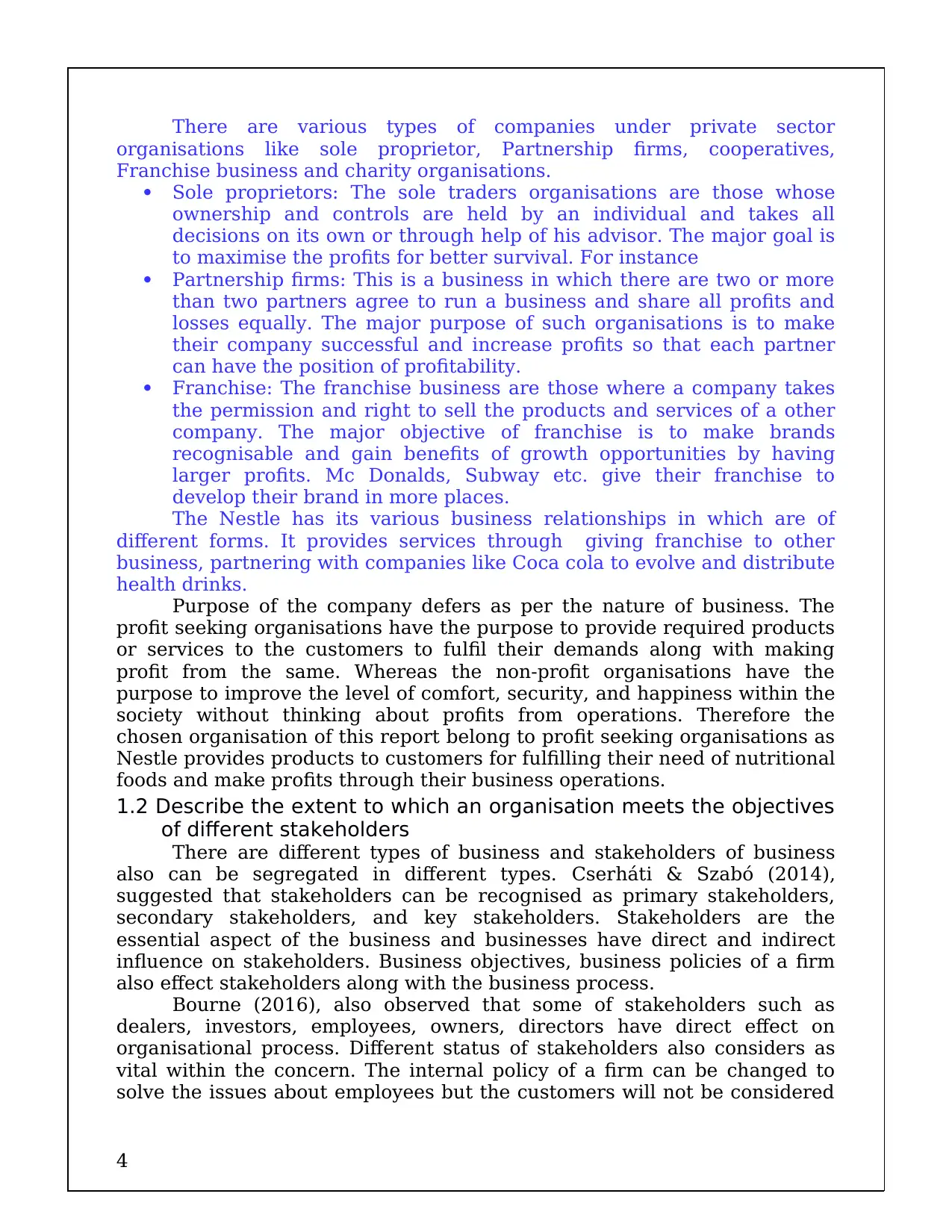
There are various types of companies under private sector
organisations like sole proprietor, Partnership firms, cooperatives,
Franchise business and charity organisations.
Sole proprietors: The sole traders organisations are those whose
ownership and controls are held by an individual and takes all
decisions on its own or through help of his advisor. The major goal is
to maximise the profits for better survival. For instance
Partnership firms: This is a business in which there are two or more
than two partners agree to run a business and share all profits and
losses equally. The major purpose of such organisations is to make
their company successful and increase profits so that each partner
can have the position of profitability.
Franchise: The franchise business are those where a company takes
the permission and right to sell the products and services of a other
company. The major objective of franchise is to make brands
recognisable and gain benefits of growth opportunities by having
larger profits. Mc Donalds, Subway etc. give their franchise to
develop their brand in more places.
The Nestle has its various business relationships in which are of
different forms. It provides services through giving franchise to other
business, partnering with companies like Coca cola to evolve and distribute
health drinks.
Purpose of the company defers as per the nature of business. The
profit seeking organisations have the purpose to provide required products
or services to the customers to fulfil their demands along with making
profit from the same. Whereas the non-profit organisations have the
purpose to improve the level of comfort, security, and happiness within the
society without thinking about profits from operations. Therefore the
chosen organisation of this report belong to profit seeking organisations as
Nestle provides products to customers for fulfilling their need of nutritional
foods and make profits through their business operations.
1.2 Describe the extent to which an organisation meets the objectives
of different stakeholders
There are different types of business and stakeholders of business
also can be segregated in different types. Cserháti & Szabó (2014),
suggested that stakeholders can be recognised as primary stakeholders,
secondary stakeholders, and key stakeholders. Stakeholders are the
essential aspect of the business and businesses have direct and indirect
influence on stakeholders. Business objectives, business policies of a firm
also effect stakeholders along with the business process.
Bourne (2016), also observed that some of stakeholders such as
dealers, investors, employees, owners, directors have direct effect on
organisational process. Different status of stakeholders also considers as
vital within the concern. The internal policy of a firm can be changed to
solve the issues about employees but the customers will not be considered
4
organisations like sole proprietor, Partnership firms, cooperatives,
Franchise business and charity organisations.
Sole proprietors: The sole traders organisations are those whose
ownership and controls are held by an individual and takes all
decisions on its own or through help of his advisor. The major goal is
to maximise the profits for better survival. For instance
Partnership firms: This is a business in which there are two or more
than two partners agree to run a business and share all profits and
losses equally. The major purpose of such organisations is to make
their company successful and increase profits so that each partner
can have the position of profitability.
Franchise: The franchise business are those where a company takes
the permission and right to sell the products and services of a other
company. The major objective of franchise is to make brands
recognisable and gain benefits of growth opportunities by having
larger profits. Mc Donalds, Subway etc. give their franchise to
develop their brand in more places.
The Nestle has its various business relationships in which are of
different forms. It provides services through giving franchise to other
business, partnering with companies like Coca cola to evolve and distribute
health drinks.
Purpose of the company defers as per the nature of business. The
profit seeking organisations have the purpose to provide required products
or services to the customers to fulfil their demands along with making
profit from the same. Whereas the non-profit organisations have the
purpose to improve the level of comfort, security, and happiness within the
society without thinking about profits from operations. Therefore the
chosen organisation of this report belong to profit seeking organisations as
Nestle provides products to customers for fulfilling their need of nutritional
foods and make profits through their business operations.
1.2 Describe the extent to which an organisation meets the objectives
of different stakeholders
There are different types of business and stakeholders of business
also can be segregated in different types. Cserháti & Szabó (2014),
suggested that stakeholders can be recognised as primary stakeholders,
secondary stakeholders, and key stakeholders. Stakeholders are the
essential aspect of the business and businesses have direct and indirect
influence on stakeholders. Business objectives, business policies of a firm
also effect stakeholders along with the business process.
Bourne (2016), also observed that some of stakeholders such as
dealers, investors, employees, owners, directors have direct effect on
organisational process. Different status of stakeholders also considers as
vital within the concern. The internal policy of a firm can be changed to
solve the issues about employees but the customers will not be considered
4
Paraphrase This Document
Need a fresh take? Get an instant paraphrase of this document with our AI Paraphraser
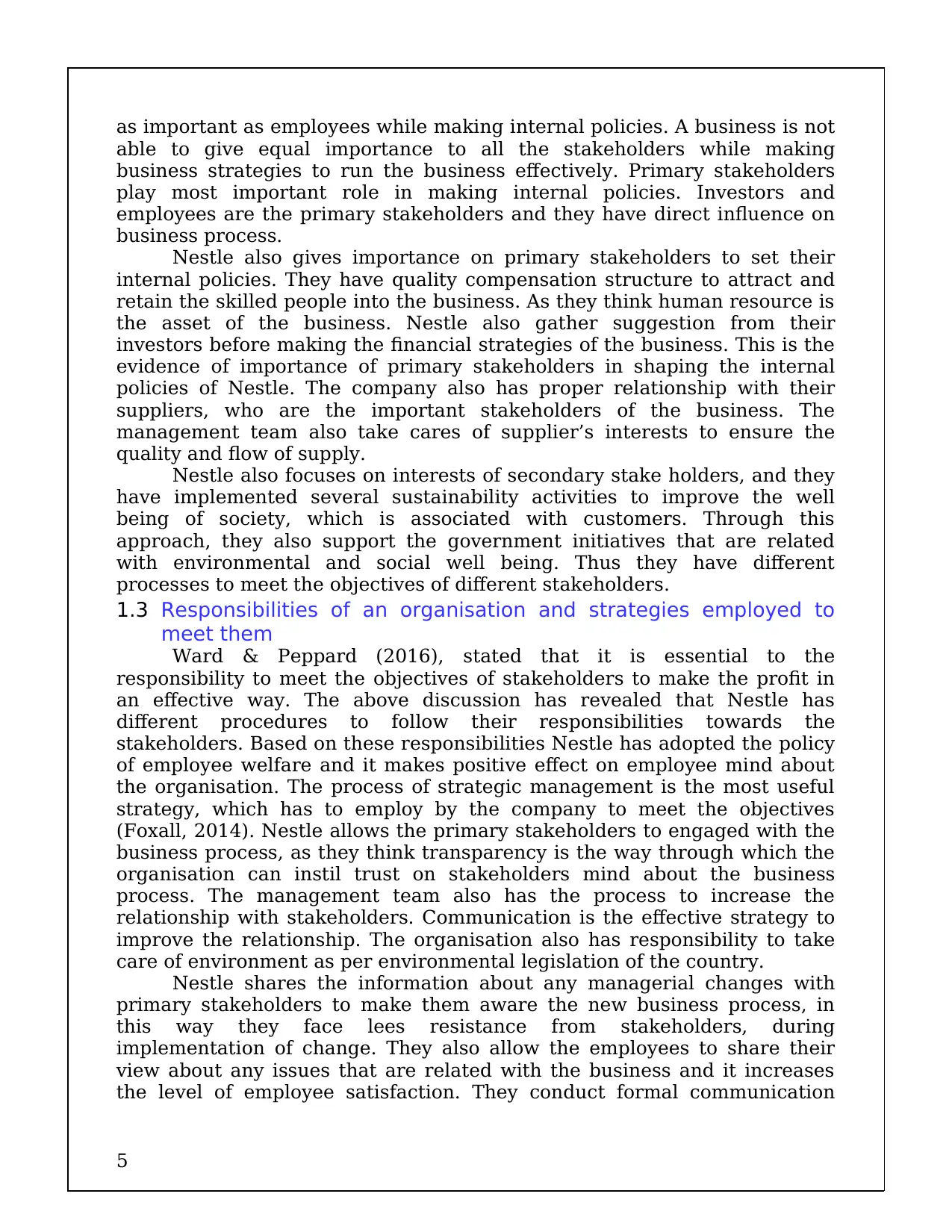
as important as employees while making internal policies. A business is not
able to give equal importance to all the stakeholders while making
business strategies to run the business effectively. Primary stakeholders
play most important role in making internal policies. Investors and
employees are the primary stakeholders and they have direct influence on
business process.
Nestle also gives importance on primary stakeholders to set their
internal policies. They have quality compensation structure to attract and
retain the skilled people into the business. As they think human resource is
the asset of the business. Nestle also gather suggestion from their
investors before making the financial strategies of the business. This is the
evidence of importance of primary stakeholders in shaping the internal
policies of Nestle. The company also has proper relationship with their
suppliers, who are the important stakeholders of the business. The
management team also take cares of supplier’s interests to ensure the
quality and flow of supply.
Nestle also focuses on interests of secondary stake holders, and they
have implemented several sustainability activities to improve the well
being of society, which is associated with customers. Through this
approach, they also support the government initiatives that are related
with environmental and social well being. Thus they have different
processes to meet the objectives of different stakeholders.
1.3 Responsibilities of an organisation and strategies employed to
meet them
Ward & Peppard (2016), stated that it is essential to the
responsibility to meet the objectives of stakeholders to make the profit in
an effective way. The above discussion has revealed that Nestle has
different procedures to follow their responsibilities towards the
stakeholders. Based on these responsibilities Nestle has adopted the policy
of employee welfare and it makes positive effect on employee mind about
the organisation. The process of strategic management is the most useful
strategy, which has to employ by the company to meet the objectives
(Foxall, 2014). Nestle allows the primary stakeholders to engaged with the
business process, as they think transparency is the way through which the
organisation can instil trust on stakeholders mind about the business
process. The management team also has the process to increase the
relationship with stakeholders. Communication is the effective strategy to
improve the relationship. The organisation also has responsibility to take
care of environment as per environmental legislation of the country.
Nestle shares the information about any managerial changes with
primary stakeholders to make them aware the new business process, in
this way they face lees resistance from stakeholders, during
implementation of change. They also allow the employees to share their
view about any issues that are related with the business and it increases
the level of employee satisfaction. They conduct formal communication
5
able to give equal importance to all the stakeholders while making
business strategies to run the business effectively. Primary stakeholders
play most important role in making internal policies. Investors and
employees are the primary stakeholders and they have direct influence on
business process.
Nestle also gives importance on primary stakeholders to set their
internal policies. They have quality compensation structure to attract and
retain the skilled people into the business. As they think human resource is
the asset of the business. Nestle also gather suggestion from their
investors before making the financial strategies of the business. This is the
evidence of importance of primary stakeholders in shaping the internal
policies of Nestle. The company also has proper relationship with their
suppliers, who are the important stakeholders of the business. The
management team also take cares of supplier’s interests to ensure the
quality and flow of supply.
Nestle also focuses on interests of secondary stake holders, and they
have implemented several sustainability activities to improve the well
being of society, which is associated with customers. Through this
approach, they also support the government initiatives that are related
with environmental and social well being. Thus they have different
processes to meet the objectives of different stakeholders.
1.3 Responsibilities of an organisation and strategies employed to
meet them
Ward & Peppard (2016), stated that it is essential to the
responsibility to meet the objectives of stakeholders to make the profit in
an effective way. The above discussion has revealed that Nestle has
different procedures to follow their responsibilities towards the
stakeholders. Based on these responsibilities Nestle has adopted the policy
of employee welfare and it makes positive effect on employee mind about
the organisation. The process of strategic management is the most useful
strategy, which has to employ by the company to meet the objectives
(Foxall, 2014). Nestle allows the primary stakeholders to engaged with the
business process, as they think transparency is the way through which the
organisation can instil trust on stakeholders mind about the business
process. The management team also has the process to increase the
relationship with stakeholders. Communication is the effective strategy to
improve the relationship. The organisation also has responsibility to take
care of environment as per environmental legislation of the country.
Nestle shares the information about any managerial changes with
primary stakeholders to make them aware the new business process, in
this way they face lees resistance from stakeholders, during
implementation of change. They also allow the employees to share their
view about any issues that are related with the business and it increases
the level of employee satisfaction. They conduct formal communication
5
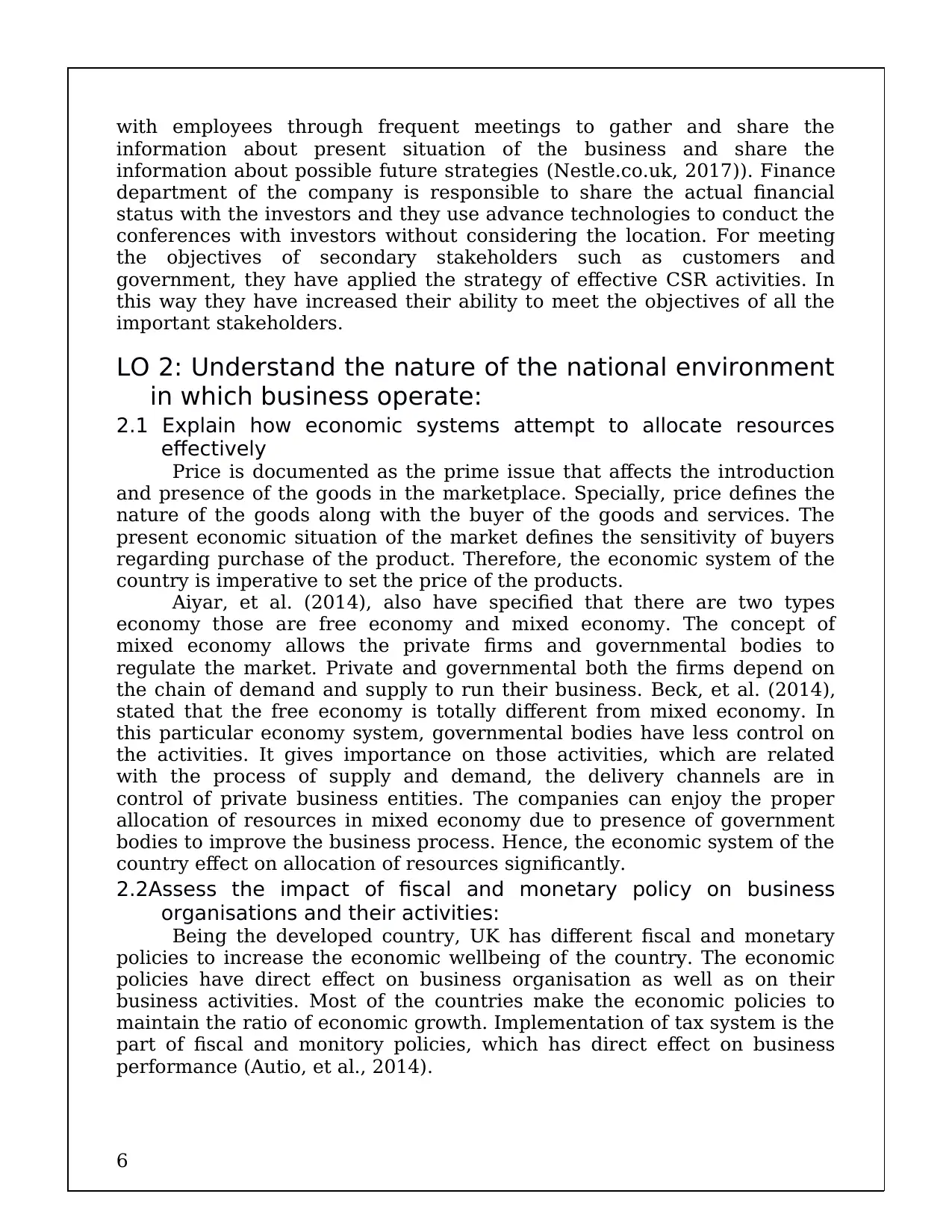
with employees through frequent meetings to gather and share the
information about present situation of the business and share the
information about possible future strategies (Nestle.co.uk, 2017)). Finance
department of the company is responsible to share the actual financial
status with the investors and they use advance technologies to conduct the
conferences with investors without considering the location. For meeting
the objectives of secondary stakeholders such as customers and
government, they have applied the strategy of effective CSR activities. In
this way they have increased their ability to meet the objectives of all the
important stakeholders.
LO 2: Understand the nature of the national environment
in which business operate:
2.1 Explain how economic systems attempt to allocate resources
effectively
Price is documented as the prime issue that affects the introduction
and presence of the goods in the marketplace. Specially, price defines the
nature of the goods along with the buyer of the goods and services. The
present economic situation of the market defines the sensitivity of buyers
regarding purchase of the product. Therefore, the economic system of the
country is imperative to set the price of the products.
Aiyar, et al. (2014), also have specified that there are two types
economy those are free economy and mixed economy. The concept of
mixed economy allows the private firms and governmental bodies to
regulate the market. Private and governmental both the firms depend on
the chain of demand and supply to run their business. Beck, et al. (2014),
stated that the free economy is totally different from mixed economy. In
this particular economy system, governmental bodies have less control on
the activities. It gives importance on those activities, which are related
with the process of supply and demand, the delivery channels are in
control of private business entities. The companies can enjoy the proper
allocation of resources in mixed economy due to presence of government
bodies to improve the business process. Hence, the economic system of the
country effect on allocation of resources significantly.
2.2Assess the impact of fiscal and monetary policy on business
organisations and their activities:
Being the developed country, UK has different fiscal and monetary
policies to increase the economic wellbeing of the country. The economic
policies have direct effect on business organisation as well as on their
business activities. Most of the countries make the economic policies to
maintain the ratio of economic growth. Implementation of tax system is the
part of fiscal and monitory policies, which has direct effect on business
performance (Autio, et al., 2014).
6
information about present situation of the business and share the
information about possible future strategies (Nestle.co.uk, 2017)). Finance
department of the company is responsible to share the actual financial
status with the investors and they use advance technologies to conduct the
conferences with investors without considering the location. For meeting
the objectives of secondary stakeholders such as customers and
government, they have applied the strategy of effective CSR activities. In
this way they have increased their ability to meet the objectives of all the
important stakeholders.
LO 2: Understand the nature of the national environment
in which business operate:
2.1 Explain how economic systems attempt to allocate resources
effectively
Price is documented as the prime issue that affects the introduction
and presence of the goods in the marketplace. Specially, price defines the
nature of the goods along with the buyer of the goods and services. The
present economic situation of the market defines the sensitivity of buyers
regarding purchase of the product. Therefore, the economic system of the
country is imperative to set the price of the products.
Aiyar, et al. (2014), also have specified that there are two types
economy those are free economy and mixed economy. The concept of
mixed economy allows the private firms and governmental bodies to
regulate the market. Private and governmental both the firms depend on
the chain of demand and supply to run their business. Beck, et al. (2014),
stated that the free economy is totally different from mixed economy. In
this particular economy system, governmental bodies have less control on
the activities. It gives importance on those activities, which are related
with the process of supply and demand, the delivery channels are in
control of private business entities. The companies can enjoy the proper
allocation of resources in mixed economy due to presence of government
bodies to improve the business process. Hence, the economic system of the
country effect on allocation of resources significantly.
2.2Assess the impact of fiscal and monetary policy on business
organisations and their activities:
Being the developed country, UK has different fiscal and monetary
policies to increase the economic wellbeing of the country. The economic
policies have direct effect on business organisation as well as on their
business activities. Most of the countries make the economic policies to
maintain the ratio of economic growth. Implementation of tax system is the
part of fiscal and monitory policies, which has direct effect on business
performance (Autio, et al., 2014).
6
⊘ This is a preview!⊘
Do you want full access?
Subscribe today to unlock all pages.

Trusted by 1+ million students worldwide
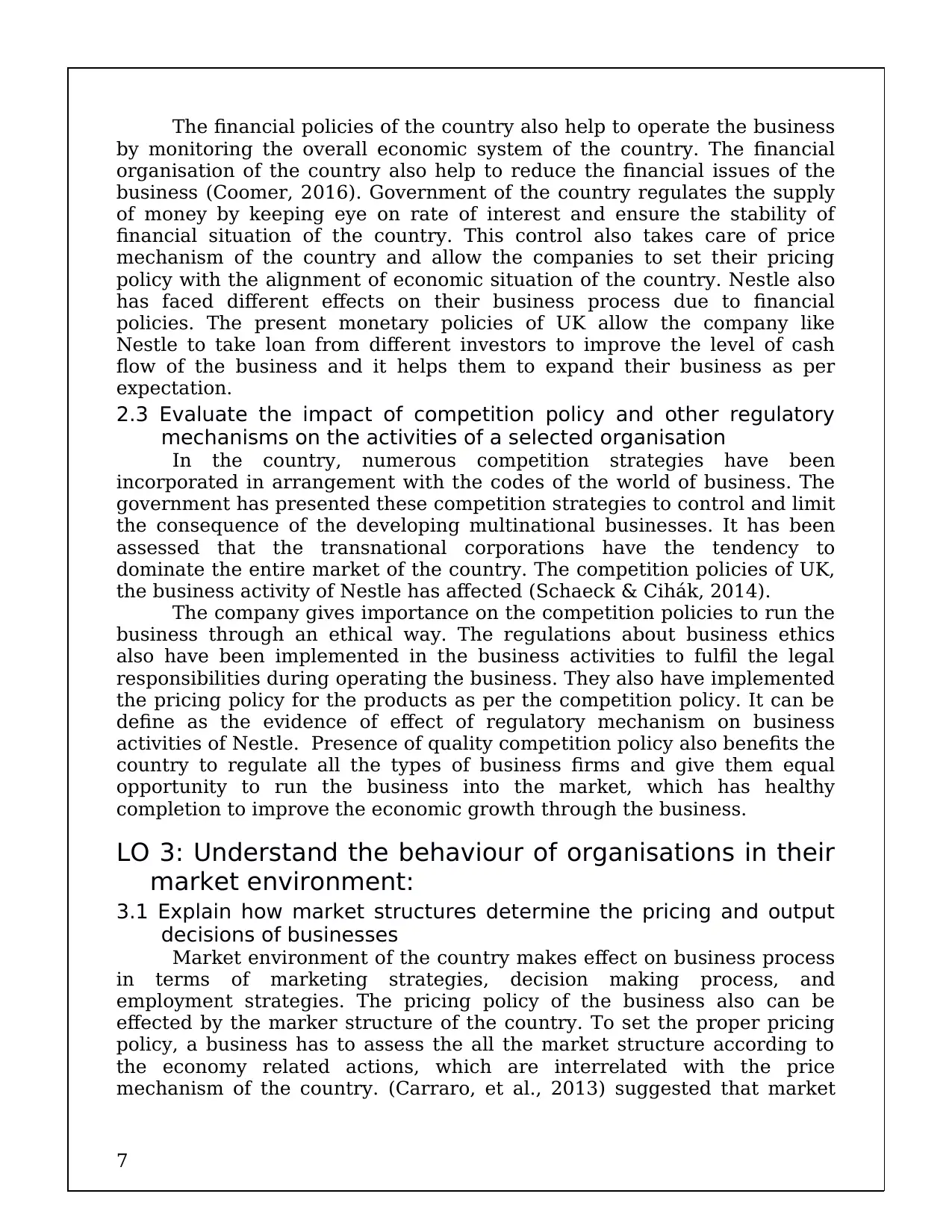
The financial policies of the country also help to operate the business
by monitoring the overall economic system of the country. The financial
organisation of the country also help to reduce the financial issues of the
business (Coomer, 2016). Government of the country regulates the supply
of money by keeping eye on rate of interest and ensure the stability of
financial situation of the country. This control also takes care of price
mechanism of the country and allow the companies to set their pricing
policy with the alignment of economic situation of the country. Nestle also
has faced different effects on their business process due to financial
policies. The present monetary policies of UK allow the company like
Nestle to take loan from different investors to improve the level of cash
flow of the business and it helps them to expand their business as per
expectation.
2.3 Evaluate the impact of competition policy and other regulatory
mechanisms on the activities of a selected organisation
In the country, numerous competition strategies have been
incorporated in arrangement with the codes of the world of business. The
government has presented these competition strategies to control and limit
the consequence of the developing multinational businesses. It has been
assessed that the transnational corporations have the tendency to
dominate the entire market of the country. The competition policies of UK,
the business activity of Nestle has affected (Schaeck & Cihák, 2014).
The company gives importance on the competition policies to run the
business through an ethical way. The regulations about business ethics
also have been implemented in the business activities to fulfil the legal
responsibilities during operating the business. They also have implemented
the pricing policy for the products as per the competition policy. It can be
define as the evidence of effect of regulatory mechanism on business
activities of Nestle. Presence of quality competition policy also benefits the
country to regulate all the types of business firms and give them equal
opportunity to run the business into the market, which has healthy
completion to improve the economic growth through the business.
LO 3: Understand the behaviour of organisations in their
market environment:
3.1 Explain how market structures determine the pricing and output
decisions of businesses
Market environment of the country makes effect on business process
in terms of marketing strategies, decision making process, and
employment strategies. The pricing policy of the business also can be
effected by the marker structure of the country. To set the proper pricing
policy, a business has to assess the all the market structure according to
the economy related actions, which are interrelated with the price
mechanism of the country. (Carraro, et al., 2013) suggested that market
7
by monitoring the overall economic system of the country. The financial
organisation of the country also help to reduce the financial issues of the
business (Coomer, 2016). Government of the country regulates the supply
of money by keeping eye on rate of interest and ensure the stability of
financial situation of the country. This control also takes care of price
mechanism of the country and allow the companies to set their pricing
policy with the alignment of economic situation of the country. Nestle also
has faced different effects on their business process due to financial
policies. The present monetary policies of UK allow the company like
Nestle to take loan from different investors to improve the level of cash
flow of the business and it helps them to expand their business as per
expectation.
2.3 Evaluate the impact of competition policy and other regulatory
mechanisms on the activities of a selected organisation
In the country, numerous competition strategies have been
incorporated in arrangement with the codes of the world of business. The
government has presented these competition strategies to control and limit
the consequence of the developing multinational businesses. It has been
assessed that the transnational corporations have the tendency to
dominate the entire market of the country. The competition policies of UK,
the business activity of Nestle has affected (Schaeck & Cihák, 2014).
The company gives importance on the competition policies to run the
business through an ethical way. The regulations about business ethics
also have been implemented in the business activities to fulfil the legal
responsibilities during operating the business. They also have implemented
the pricing policy for the products as per the competition policy. It can be
define as the evidence of effect of regulatory mechanism on business
activities of Nestle. Presence of quality competition policy also benefits the
country to regulate all the types of business firms and give them equal
opportunity to run the business into the market, which has healthy
completion to improve the economic growth through the business.
LO 3: Understand the behaviour of organisations in their
market environment:
3.1 Explain how market structures determine the pricing and output
decisions of businesses
Market environment of the country makes effect on business process
in terms of marketing strategies, decision making process, and
employment strategies. The pricing policy of the business also can be
effected by the marker structure of the country. To set the proper pricing
policy, a business has to assess the all the market structure according to
the economy related actions, which are interrelated with the price
mechanism of the country. (Carraro, et al., 2013) suggested that market
7
Paraphrase This Document
Need a fresh take? Get an instant paraphrase of this document with our AI Paraphraser
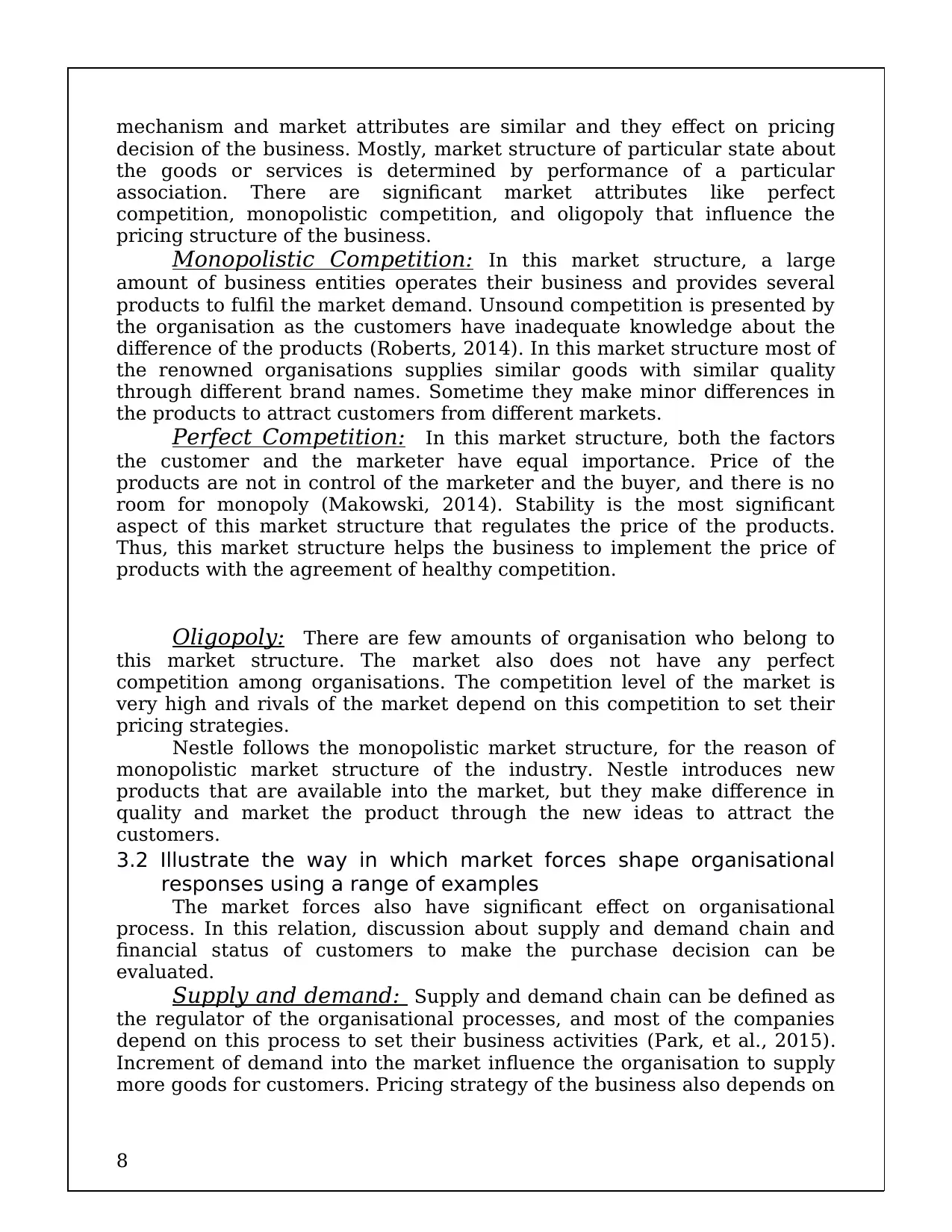
mechanism and market attributes are similar and they effect on pricing
decision of the business. Mostly, market structure of particular state about
the goods or services is determined by performance of a particular
association. There are significant market attributes like perfect
competition, monopolistic competition, and oligopoly that influence the
pricing structure of the business.
Monopolistic Competition: In this market structure, a large
amount of business entities operates their business and provides several
products to fulfil the market demand. Unsound competition is presented by
the organisation as the customers have inadequate knowledge about the
difference of the products (Roberts, 2014). In this market structure most of
the renowned organisations supplies similar goods with similar quality
through different brand names. Sometime they make minor differences in
the products to attract customers from different markets.
Perfect Competition: In this market structure, both the factors
the customer and the marketer have equal importance. Price of the
products are not in control of the marketer and the buyer, and there is no
room for monopoly (Makowski, 2014). Stability is the most significant
aspect of this market structure that regulates the price of the products.
Thus, this market structure helps the business to implement the price of
products with the agreement of healthy competition.
Oligopoly: There are few amounts of organisation who belong to
this market structure. The market also does not have any perfect
competition among organisations. The competition level of the market is
very high and rivals of the market depend on this competition to set their
pricing strategies.
Nestle follows the monopolistic market structure, for the reason of
monopolistic market structure of the industry. Nestle introduces new
products that are available into the market, but they make difference in
quality and market the product through the new ideas to attract the
customers.
3.2 Illustrate the way in which market forces shape organisational
responses using a range of examples
The market forces also have significant effect on organisational
process. In this relation, discussion about supply and demand chain and
financial status of customers to make the purchase decision can be
evaluated.
Supply and demand: Supply and demand chain can be defined as
the regulator of the organisational processes, and most of the companies
depend on this process to set their business activities (Park, et al., 2015).
Increment of demand into the market influence the organisation to supply
more goods for customers. Pricing strategy of the business also depends on
8
decision of the business. Mostly, market structure of particular state about
the goods or services is determined by performance of a particular
association. There are significant market attributes like perfect
competition, monopolistic competition, and oligopoly that influence the
pricing structure of the business.
Monopolistic Competition: In this market structure, a large
amount of business entities operates their business and provides several
products to fulfil the market demand. Unsound competition is presented by
the organisation as the customers have inadequate knowledge about the
difference of the products (Roberts, 2014). In this market structure most of
the renowned organisations supplies similar goods with similar quality
through different brand names. Sometime they make minor differences in
the products to attract customers from different markets.
Perfect Competition: In this market structure, both the factors
the customer and the marketer have equal importance. Price of the
products are not in control of the marketer and the buyer, and there is no
room for monopoly (Makowski, 2014). Stability is the most significant
aspect of this market structure that regulates the price of the products.
Thus, this market structure helps the business to implement the price of
products with the agreement of healthy competition.
Oligopoly: There are few amounts of organisation who belong to
this market structure. The market also does not have any perfect
competition among organisations. The competition level of the market is
very high and rivals of the market depend on this competition to set their
pricing strategies.
Nestle follows the monopolistic market structure, for the reason of
monopolistic market structure of the industry. Nestle introduces new
products that are available into the market, but they make difference in
quality and market the product through the new ideas to attract the
customers.
3.2 Illustrate the way in which market forces shape organisational
responses using a range of examples
The market forces also have significant effect on organisational
process. In this relation, discussion about supply and demand chain and
financial status of customers to make the purchase decision can be
evaluated.
Supply and demand: Supply and demand chain can be defined as
the regulator of the organisational processes, and most of the companies
depend on this process to set their business activities (Park, et al., 2015).
Increment of demand into the market influence the organisation to supply
more goods for customers. Pricing strategy of the business also depends on
8
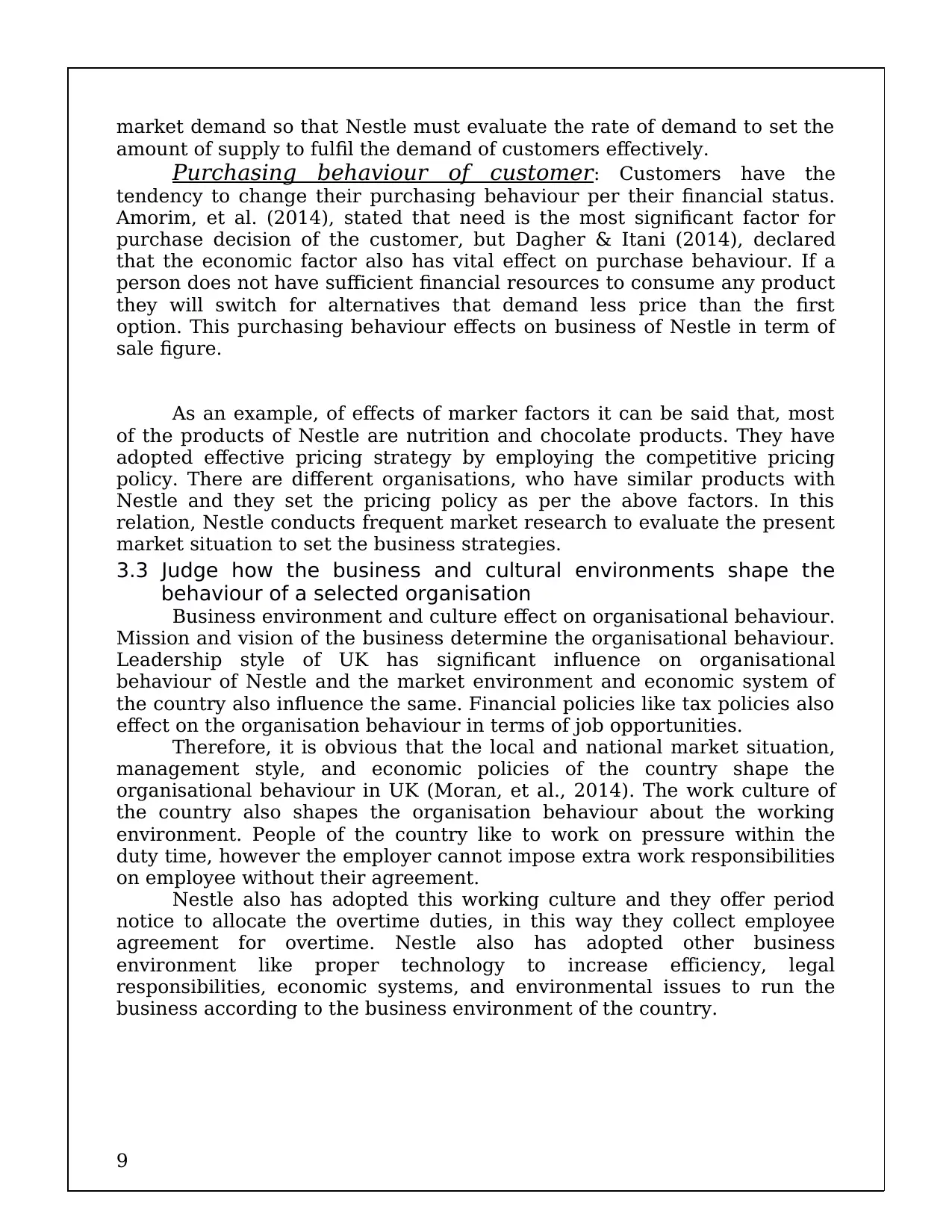
market demand so that Nestle must evaluate the rate of demand to set the
amount of supply to fulfil the demand of customers effectively.
Purchasing behaviour of customer: Customers have the
tendency to change their purchasing behaviour per their financial status.
Amorim, et al. (2014), stated that need is the most significant factor for
purchase decision of the customer, but Dagher & Itani (2014), declared
that the economic factor also has vital effect on purchase behaviour. If a
person does not have sufficient financial resources to consume any product
they will switch for alternatives that demand less price than the first
option. This purchasing behaviour effects on business of Nestle in term of
sale figure.
As an example, of effects of marker factors it can be said that, most
of the products of Nestle are nutrition and chocolate products. They have
adopted effective pricing strategy by employing the competitive pricing
policy. There are different organisations, who have similar products with
Nestle and they set the pricing policy as per the above factors. In this
relation, Nestle conducts frequent market research to evaluate the present
market situation to set the business strategies.
3.3 Judge how the business and cultural environments shape the
behaviour of a selected organisation
Business environment and culture effect on organisational behaviour.
Mission and vision of the business determine the organisational behaviour.
Leadership style of UK has significant influence on organisational
behaviour of Nestle and the market environment and economic system of
the country also influence the same. Financial policies like tax policies also
effect on the organisation behaviour in terms of job opportunities.
Therefore, it is obvious that the local and national market situation,
management style, and economic policies of the country shape the
organisational behaviour in UK (Moran, et al., 2014). The work culture of
the country also shapes the organisation behaviour about the working
environment. People of the country like to work on pressure within the
duty time, however the employer cannot impose extra work responsibilities
on employee without their agreement.
Nestle also has adopted this working culture and they offer period
notice to allocate the overtime duties, in this way they collect employee
agreement for overtime. Nestle also has adopted other business
environment like proper technology to increase efficiency, legal
responsibilities, economic systems, and environmental issues to run the
business according to the business environment of the country.
9
amount of supply to fulfil the demand of customers effectively.
Purchasing behaviour of customer: Customers have the
tendency to change their purchasing behaviour per their financial status.
Amorim, et al. (2014), stated that need is the most significant factor for
purchase decision of the customer, but Dagher & Itani (2014), declared
that the economic factor also has vital effect on purchase behaviour. If a
person does not have sufficient financial resources to consume any product
they will switch for alternatives that demand less price than the first
option. This purchasing behaviour effects on business of Nestle in term of
sale figure.
As an example, of effects of marker factors it can be said that, most
of the products of Nestle are nutrition and chocolate products. They have
adopted effective pricing strategy by employing the competitive pricing
policy. There are different organisations, who have similar products with
Nestle and they set the pricing policy as per the above factors. In this
relation, Nestle conducts frequent market research to evaluate the present
market situation to set the business strategies.
3.3 Judge how the business and cultural environments shape the
behaviour of a selected organisation
Business environment and culture effect on organisational behaviour.
Mission and vision of the business determine the organisational behaviour.
Leadership style of UK has significant influence on organisational
behaviour of Nestle and the market environment and economic system of
the country also influence the same. Financial policies like tax policies also
effect on the organisation behaviour in terms of job opportunities.
Therefore, it is obvious that the local and national market situation,
management style, and economic policies of the country shape the
organisational behaviour in UK (Moran, et al., 2014). The work culture of
the country also shapes the organisation behaviour about the working
environment. People of the country like to work on pressure within the
duty time, however the employer cannot impose extra work responsibilities
on employee without their agreement.
Nestle also has adopted this working culture and they offer period
notice to allocate the overtime duties, in this way they collect employee
agreement for overtime. Nestle also has adopted other business
environment like proper technology to increase efficiency, legal
responsibilities, economic systems, and environmental issues to run the
business according to the business environment of the country.
9
⊘ This is a preview!⊘
Do you want full access?
Subscribe today to unlock all pages.

Trusted by 1+ million students worldwide
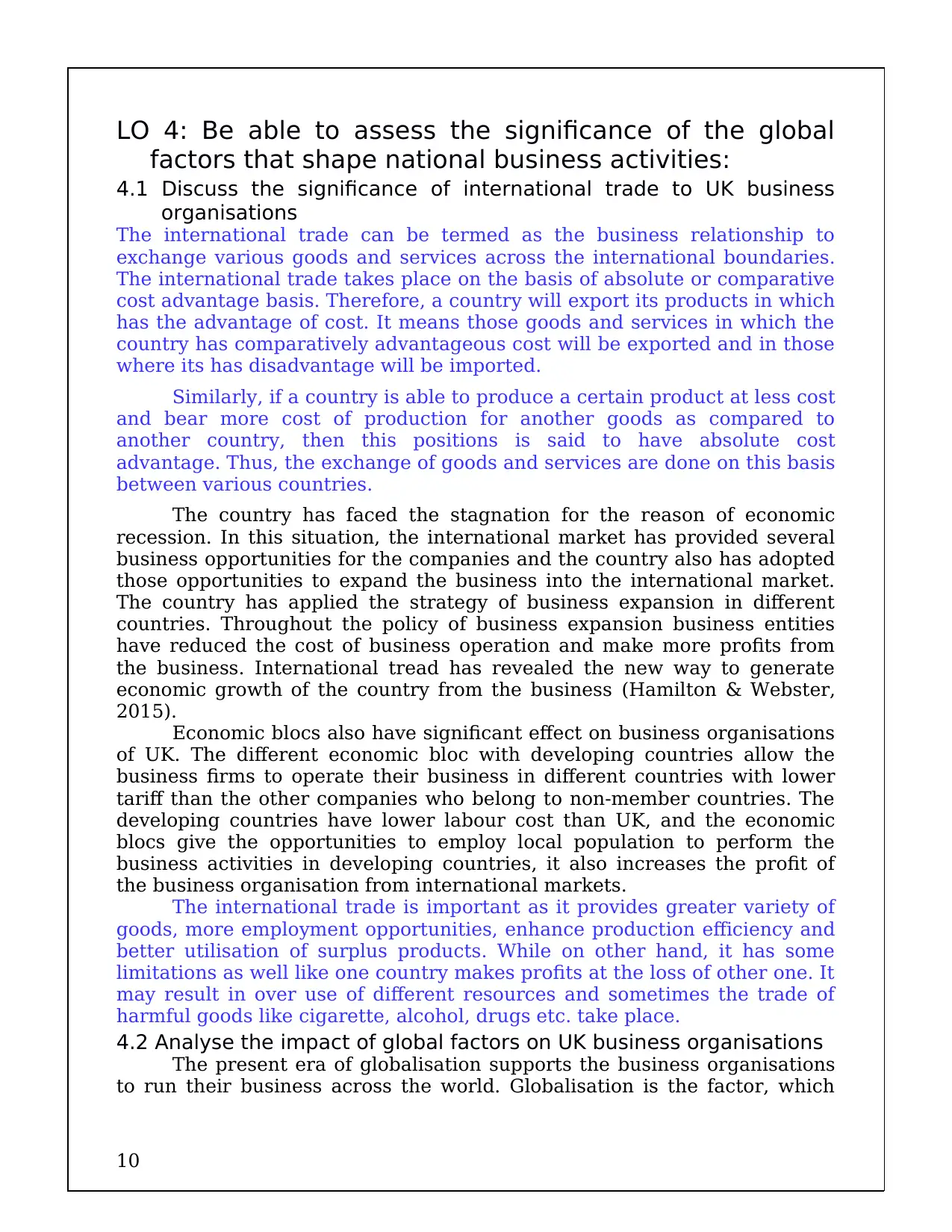
LO 4: Be able to assess the significance of the global
factors that shape national business activities:
4.1 Discuss the significance of international trade to UK business
organisations
The international trade can be termed as the business relationship to
exchange various goods and services across the international boundaries.
The international trade takes place on the basis of absolute or comparative
cost advantage basis. Therefore, a country will export its products in which
has the advantage of cost. It means those goods and services in which the
country has comparatively advantageous cost will be exported and in those
where its has disadvantage will be imported.
Similarly, if a country is able to produce a certain product at less cost
and bear more cost of production for another goods as compared to
another country, then this positions is said to have absolute cost
advantage. Thus, the exchange of goods and services are done on this basis
between various countries.
The country has faced the stagnation for the reason of economic
recession. In this situation, the international market has provided several
business opportunities for the companies and the country also has adopted
those opportunities to expand the business into the international market.
The country has applied the strategy of business expansion in different
countries. Throughout the policy of business expansion business entities
have reduced the cost of business operation and make more profits from
the business. International tread has revealed the new way to generate
economic growth of the country from the business (Hamilton & Webster,
2015).
Economic blocs also have significant effect on business organisations
of UK. The different economic bloc with developing countries allow the
business firms to operate their business in different countries with lower
tariff than the other companies who belong to non-member countries. The
developing countries have lower labour cost than UK, and the economic
blocs give the opportunities to employ local population to perform the
business activities in developing countries, it also increases the profit of
the business organisation from international markets.
The international trade is important as it provides greater variety of
goods, more employment opportunities, enhance production efficiency and
better utilisation of surplus products. While on other hand, it has some
limitations as well like one country makes profits at the loss of other one. It
may result in over use of different resources and sometimes the trade of
harmful goods like cigarette, alcohol, drugs etc. take place.
4.2 Analyse the impact of global factors on UK business organisations
The present era of globalisation supports the business organisations
to run their business across the world. Globalisation is the factor, which
10
factors that shape national business activities:
4.1 Discuss the significance of international trade to UK business
organisations
The international trade can be termed as the business relationship to
exchange various goods and services across the international boundaries.
The international trade takes place on the basis of absolute or comparative
cost advantage basis. Therefore, a country will export its products in which
has the advantage of cost. It means those goods and services in which the
country has comparatively advantageous cost will be exported and in those
where its has disadvantage will be imported.
Similarly, if a country is able to produce a certain product at less cost
and bear more cost of production for another goods as compared to
another country, then this positions is said to have absolute cost
advantage. Thus, the exchange of goods and services are done on this basis
between various countries.
The country has faced the stagnation for the reason of economic
recession. In this situation, the international market has provided several
business opportunities for the companies and the country also has adopted
those opportunities to expand the business into the international market.
The country has applied the strategy of business expansion in different
countries. Throughout the policy of business expansion business entities
have reduced the cost of business operation and make more profits from
the business. International tread has revealed the new way to generate
economic growth of the country from the business (Hamilton & Webster,
2015).
Economic blocs also have significant effect on business organisations
of UK. The different economic bloc with developing countries allow the
business firms to operate their business in different countries with lower
tariff than the other companies who belong to non-member countries. The
developing countries have lower labour cost than UK, and the economic
blocs give the opportunities to employ local population to perform the
business activities in developing countries, it also increases the profit of
the business organisation from international markets.
The international trade is important as it provides greater variety of
goods, more employment opportunities, enhance production efficiency and
better utilisation of surplus products. While on other hand, it has some
limitations as well like one country makes profits at the loss of other one. It
may result in over use of different resources and sometimes the trade of
harmful goods like cigarette, alcohol, drugs etc. take place.
4.2 Analyse the impact of global factors on UK business organisations
The present era of globalisation supports the business organisations
to run their business across the world. Globalisation is the factor, which
10
Paraphrase This Document
Need a fresh take? Get an instant paraphrase of this document with our AI Paraphraser
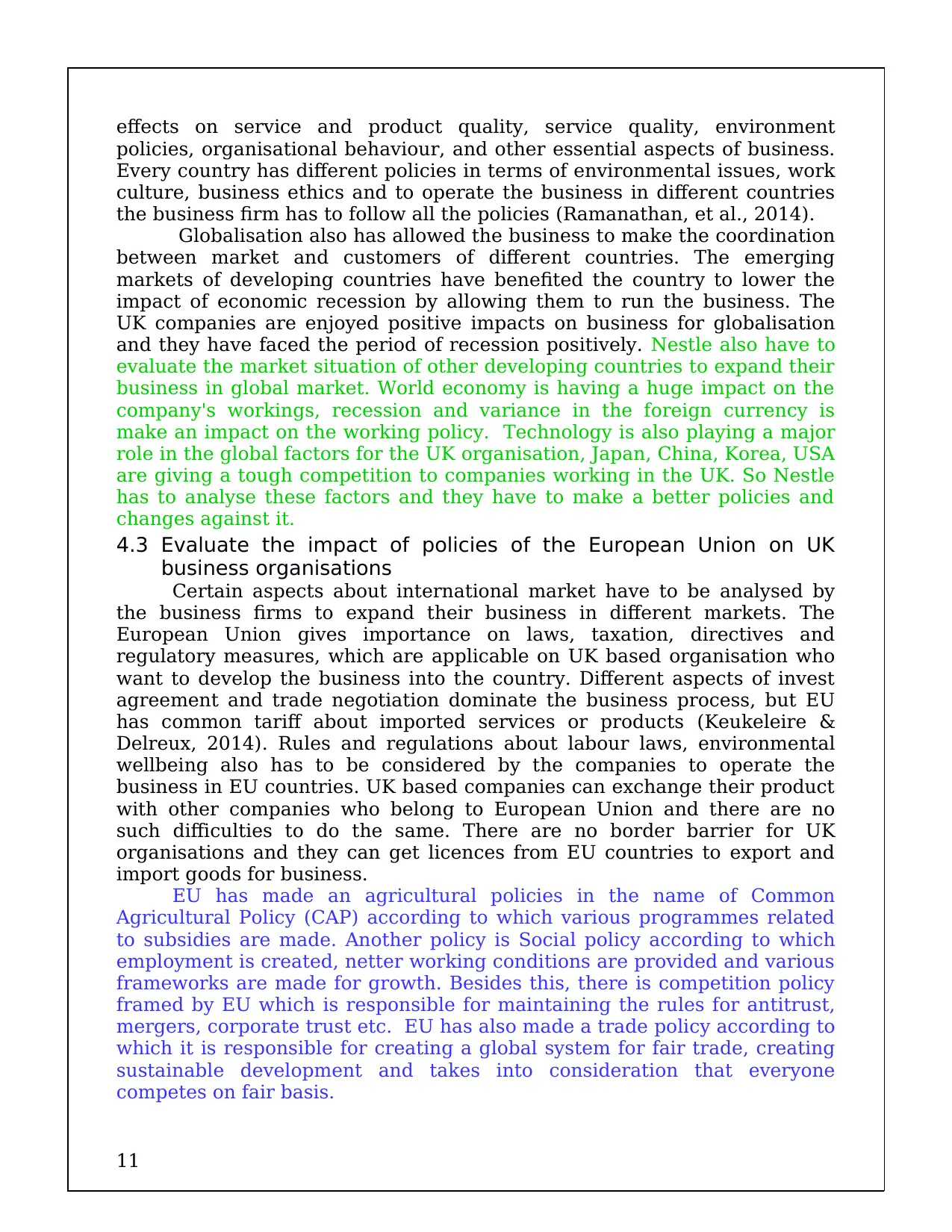
effects on service and product quality, service quality, environment
policies, organisational behaviour, and other essential aspects of business.
Every country has different policies in terms of environmental issues, work
culture, business ethics and to operate the business in different countries
the business firm has to follow all the policies (Ramanathan, et al., 2014).
Globalisation also has allowed the business to make the coordination
between market and customers of different countries. The emerging
markets of developing countries have benefited the country to lower the
impact of economic recession by allowing them to run the business. The
UK companies are enjoyed positive impacts on business for globalisation
and they have faced the period of recession positively. Nestle also have to
evaluate the market situation of other developing countries to expand their
business in global market. World economy is having a huge impact on the
company's workings, recession and variance in the foreign currency is
make an impact on the working policy. Technology is also playing a major
role in the global factors for the UK organisation, Japan, China, Korea, USA
are giving a tough competition to companies working in the UK. So Nestle
has to analyse these factors and they have to make a better policies and
changes against it.
4.3 Evaluate the impact of policies of the European Union on UK
business organisations
Certain aspects about international market have to be analysed by
the business firms to expand their business in different markets. The
European Union gives importance on laws, taxation, directives and
regulatory measures, which are applicable on UK based organisation who
want to develop the business into the country. Different aspects of invest
agreement and trade negotiation dominate the business process, but EU
has common tariff about imported services or products (Keukeleire &
Delreux, 2014). Rules and regulations about labour laws, environmental
wellbeing also has to be considered by the companies to operate the
business in EU countries. UK based companies can exchange their product
with other companies who belong to European Union and there are no
such difficulties to do the same. There are no border barrier for UK
organisations and they can get licences from EU countries to export and
import goods for business.
EU has made an agricultural policies in the name of Common
Agricultural Policy (CAP) according to which various programmes related
to subsidies are made. Another policy is Social policy according to which
employment is created, netter working conditions are provided and various
frameworks are made for growth. Besides this, there is competition policy
framed by EU which is responsible for maintaining the rules for antitrust,
mergers, corporate trust etc. EU has also made a trade policy according to
which it is responsible for creating a global system for fair trade, creating
sustainable development and takes into consideration that everyone
competes on fair basis.
11
policies, organisational behaviour, and other essential aspects of business.
Every country has different policies in terms of environmental issues, work
culture, business ethics and to operate the business in different countries
the business firm has to follow all the policies (Ramanathan, et al., 2014).
Globalisation also has allowed the business to make the coordination
between market and customers of different countries. The emerging
markets of developing countries have benefited the country to lower the
impact of economic recession by allowing them to run the business. The
UK companies are enjoyed positive impacts on business for globalisation
and they have faced the period of recession positively. Nestle also have to
evaluate the market situation of other developing countries to expand their
business in global market. World economy is having a huge impact on the
company's workings, recession and variance in the foreign currency is
make an impact on the working policy. Technology is also playing a major
role in the global factors for the UK organisation, Japan, China, Korea, USA
are giving a tough competition to companies working in the UK. So Nestle
has to analyse these factors and they have to make a better policies and
changes against it.
4.3 Evaluate the impact of policies of the European Union on UK
business organisations
Certain aspects about international market have to be analysed by
the business firms to expand their business in different markets. The
European Union gives importance on laws, taxation, directives and
regulatory measures, which are applicable on UK based organisation who
want to develop the business into the country. Different aspects of invest
agreement and trade negotiation dominate the business process, but EU
has common tariff about imported services or products (Keukeleire &
Delreux, 2014). Rules and regulations about labour laws, environmental
wellbeing also has to be considered by the companies to operate the
business in EU countries. UK based companies can exchange their product
with other companies who belong to European Union and there are no
such difficulties to do the same. There are no border barrier for UK
organisations and they can get licences from EU countries to export and
import goods for business.
EU has made an agricultural policies in the name of Common
Agricultural Policy (CAP) according to which various programmes related
to subsidies are made. Another policy is Social policy according to which
employment is created, netter working conditions are provided and various
frameworks are made for growth. Besides this, there is competition policy
framed by EU which is responsible for maintaining the rules for antitrust,
mergers, corporate trust etc. EU has also made a trade policy according to
which it is responsible for creating a global system for fair trade, creating
sustainable development and takes into consideration that everyone
competes on fair basis.
11
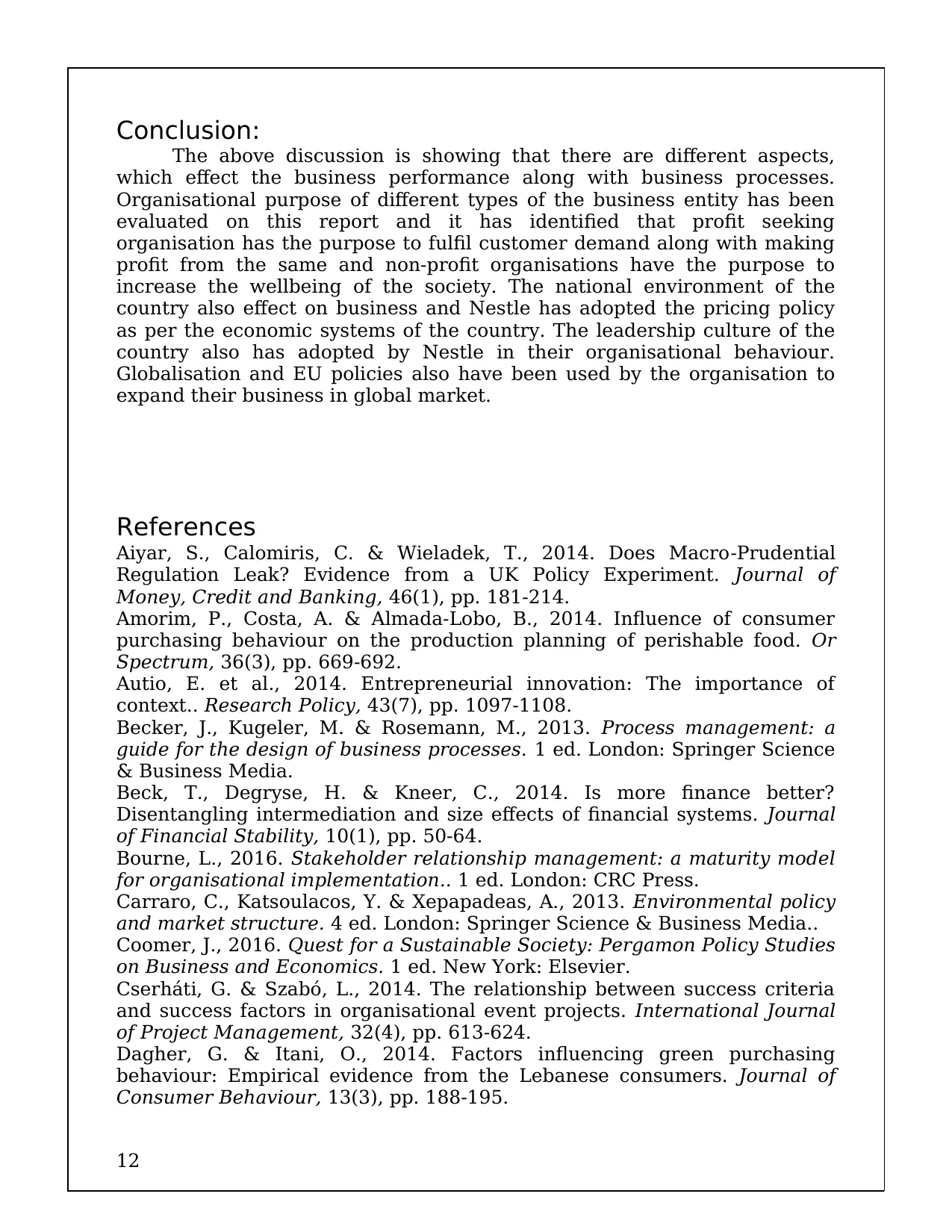
Conclusion:
The above discussion is showing that there are different aspects,
which effect the business performance along with business processes.
Organisational purpose of different types of the business entity has been
evaluated on this report and it has identified that profit seeking
organisation has the purpose to fulfil customer demand along with making
profit from the same and non-profit organisations have the purpose to
increase the wellbeing of the society. The national environment of the
country also effect on business and Nestle has adopted the pricing policy
as per the economic systems of the country. The leadership culture of the
country also has adopted by Nestle in their organisational behaviour.
Globalisation and EU policies also have been used by the organisation to
expand their business in global market.
References
Aiyar, S., Calomiris, C. & Wieladek, T., 2014. Does Macro‐Prudential
Regulation Leak? Evidence from a UK Policy Experiment. Journal of
Money, Credit and Banking, 46(1), pp. 181-214.
Amorim, P., Costa, A. & Almada-Lobo, B., 2014. Influence of consumer
purchasing behaviour on the production planning of perishable food. Or
Spectrum, 36(3), pp. 669-692.
Autio, E. et al., 2014. Entrepreneurial innovation: The importance of
context.. Research Policy, 43(7), pp. 1097-1108.
Becker, J., Kugeler, M. & Rosemann, M., 2013. Process management: a
guide for the design of business processes. 1 ed. London: Springer Science
& Business Media.
Beck, T., Degryse, H. & Kneer, C., 2014. Is more finance better?
Disentangling intermediation and size effects of financial systems. Journal
of Financial Stability, 10(1), pp. 50-64.
Bourne, L., 2016. Stakeholder relationship management: a maturity model
for organisational implementation.. 1 ed. London: CRC Press.
Carraro, C., Katsoulacos, Y. & Xepapadeas, A., 2013. Environmental policy
and market structure. 4 ed. London: Springer Science & Business Media..
Coomer, J., 2016. Quest for a Sustainable Society: Pergamon Policy Studies
on Business and Economics. 1 ed. New York: Elsevier.
Cserháti, G. & Szabó, L., 2014. The relationship between success criteria
and success factors in organisational event projects. International Journal
of Project Management, 32(4), pp. 613-624.
Dagher, G. & Itani, O., 2014. Factors influencing green purchasing
behaviour: Empirical evidence from the Lebanese consumers. Journal of
Consumer Behaviour, 13(3), pp. 188-195.
12
The above discussion is showing that there are different aspects,
which effect the business performance along with business processes.
Organisational purpose of different types of the business entity has been
evaluated on this report and it has identified that profit seeking
organisation has the purpose to fulfil customer demand along with making
profit from the same and non-profit organisations have the purpose to
increase the wellbeing of the society. The national environment of the
country also effect on business and Nestle has adopted the pricing policy
as per the economic systems of the country. The leadership culture of the
country also has adopted by Nestle in their organisational behaviour.
Globalisation and EU policies also have been used by the organisation to
expand their business in global market.
References
Aiyar, S., Calomiris, C. & Wieladek, T., 2014. Does Macro‐Prudential
Regulation Leak? Evidence from a UK Policy Experiment. Journal of
Money, Credit and Banking, 46(1), pp. 181-214.
Amorim, P., Costa, A. & Almada-Lobo, B., 2014. Influence of consumer
purchasing behaviour on the production planning of perishable food. Or
Spectrum, 36(3), pp. 669-692.
Autio, E. et al., 2014. Entrepreneurial innovation: The importance of
context.. Research Policy, 43(7), pp. 1097-1108.
Becker, J., Kugeler, M. & Rosemann, M., 2013. Process management: a
guide for the design of business processes. 1 ed. London: Springer Science
& Business Media.
Beck, T., Degryse, H. & Kneer, C., 2014. Is more finance better?
Disentangling intermediation and size effects of financial systems. Journal
of Financial Stability, 10(1), pp. 50-64.
Bourne, L., 2016. Stakeholder relationship management: a maturity model
for organisational implementation.. 1 ed. London: CRC Press.
Carraro, C., Katsoulacos, Y. & Xepapadeas, A., 2013. Environmental policy
and market structure. 4 ed. London: Springer Science & Business Media..
Coomer, J., 2016. Quest for a Sustainable Society: Pergamon Policy Studies
on Business and Economics. 1 ed. New York: Elsevier.
Cserháti, G. & Szabó, L., 2014. The relationship between success criteria
and success factors in organisational event projects. International Journal
of Project Management, 32(4), pp. 613-624.
Dagher, G. & Itani, O., 2014. Factors influencing green purchasing
behaviour: Empirical evidence from the Lebanese consumers. Journal of
Consumer Behaviour, 13(3), pp. 188-195.
12
⊘ This is a preview!⊘
Do you want full access?
Subscribe today to unlock all pages.

Trusted by 1+ million students worldwide
1 out of 13
Related Documents
Your All-in-One AI-Powered Toolkit for Academic Success.
+13062052269
info@desklib.com
Available 24*7 on WhatsApp / Email
![[object Object]](/_next/static/media/star-bottom.7253800d.svg)
Unlock your academic potential
Copyright © 2020–2026 A2Z Services. All Rights Reserved. Developed and managed by ZUCOL.





